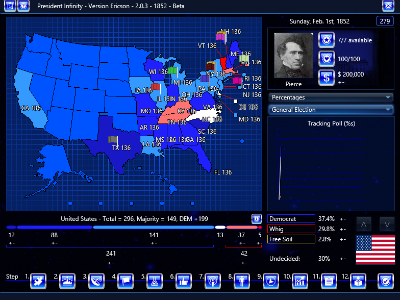*This scenario was updated greatly by the Historical Scenario Commission on July 27, 2017. Version 2.0 can be downloaded here: United States – 1852 v. 2.0
This election takes place two years after the Great Compromise, which delayed the Civil War by ten years. At the time, many thought it could achieve a permanent fix; however, taken by president from 1852-1860 quickly undid this legislation. The three great senators of the 19th century, Henry Clay, Daniel Webster and John C. Calhoun, all worked to keep the union together by advocating this legislation. Each took a hit to their reputation for their bipartisanship. Stephen A. Douglas, one of Lincoln’s rivals, played an important part by organizing the Compromise in a way that would allow it to pass.
Unfortunately, the 1852 election was a dawning of a new age. Calhoun had recently died, Clay would be dead mid-year, and Webster towards the end of the year. A new generation of politicians was emerging. Another recent death was that of President Zachary Taylor, who said he would not sign the compromise and then would go to war with any state that seceded. After Taylor’s death, Millard Fillmore signed the document. Despite Fillmore coming together with Congress, he is unable to win over people within his own party or voters to the Whig banner. The election looks to be a shoe-in for the Democrats.
For the Whigs, with Fillmore loosing support for reelection, the Whig Party turns once again to a hero of the Mexican War. This time it is Winfield Scott, arguably the most impressive general in US history, when considering his successes. At 6’5″ and nearing 300 lbs, he would be the largest president if elected. However, he lacks polish as a politician. Another challenger is the ailing Daniel Webster, who is strong only in his New England stronghold.
The Democrats have two front-runner, the expansionist Lewis Cass, whow as the nominee in 1848, and James Buchanan, who is favored in the South and in Pennsylvania. William Marcy, Stephen A. Douglas and Sam Houston are also candidates. Deep in the shadow is Franklin Pierce, who hopes to emerge as a compromise candidate that is suitable to Southerners, expansionists and Northerners.
The Free Soil Party, led by John P. Hale, is the party for abolitionists.
The election allows for many what-if scenarios:
- What if the rising Whig William H. Seward ran?
- What if a well-known compromisor, John J. Crittenden, ran for the Whig ticket?
- What if former Rep. Abraham Lincoln ran before he developed a name for himself as an orator?
Feedback is desired. The costs for barnstorming, etc appears to be off. If anyone can help me figure out the best dollar level for the campaign actions, then it would be helpful. Thanks.


Finally got Winfield Scott elected! These early mid-1800 campaigns have been great. I was wondering though if there were any other possible candidates that could be added for the Democrats and Free Soil parties? There was a contested Free Soil convention in 1848 and extra major candidates makes for more exciting primaries. Turning on all the candidates in 1860 and watching as Smith was fun in itself!
Maybe Levi Woodbury if he’d lived, Thomas Hart Benton, and William R. King as off candidates in an update for the Democrats?
Could there be an update with Zachary Taylor in it if he lived?
@Dylan
I’ll probably add Taylor
Henry C. Murphy was nearly put forward as a compromise candidate, instead of Franklin Pierce.
Third party candidates:
Union – Charles Jenkins
Know Nothing – Daniel Webster, Jacob Broom
Southern Rights – George Troup
Webster was also under the Union party ticket. Jenkins was the VP nominee.
The Know Nothings also put forth George Corbin Washington as Webster’s VP nominee, but changed it after Webster died. I’ll put VP candidates in another post I guess.
Why does William A. Graham only have a 1 in charisma?
Third-Party Bids to Add:
George T. Troup (Southern Rights): Got 5% in Alabama; could also appear in Georgia for the Independent Democratic slate that got 9.3%, but given the precedent set by 1832’s lack of a Barbour slate across the South, this will likely go under Democrats.
Daniel Webster (Union Whig): Got 8.5% in Georgia, 1.3% in Massachusetts
Jacob Broom (American) got .9% of the vote in New Jersey, falling below the 1% inclusion line.